
The Union of South Africa was the historical predecessor to the present-day Republic of South Africa. It came into existence on 31 May 1910 with the unification of the Cape, Natal, Transvaal, and Orange River colonies. It included the territories that were formerly a part of the South African Republic and the Orange Free State.

The Orange River Colony was the British colony created after Britain first occupied (1900) and then annexed (1902) the independent Orange Free State in the Second Boer War. The colony ceased to exist in 1910, when it was absorbed into the Union of South Africa as Orange Free State Province.
The year 1870 in the history of the Cape Colony marks the dawn of a new era in South Africa, and it can be said that the development of modern South Africa began on that date. Despite political complications that arose from time to time, progress in Cape Colony continued at a steady pace until the outbreak of the Anglo-Boer Wars in 1899. The discovery of diamonds in the Orange River in 1867 was immediately followed by similar finds in the Vaal River. This led to the rapid occupation and development of huge tracts of the country, which had hitherto been sparsely inhabited. Dutoitspan and Bultfontein diamond mines were discovered in 1870, and in 1871 the even richer mines of Kimberley and De Beers were discovered. These four great deposits of mineral wealth were incredibly productive, and constituted the greatest industrial asset that the Colony possessed.
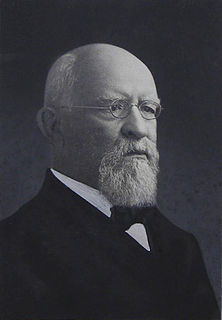
Jan Hendrik Hofmeyr was a South African politician. He was affectionately known as Onze Jan, "our Jan" in Dutch.
Cape Dutch, also commonly known as Cape Afrikaners, were a historic socioeconomic class of Afrikaners who lived in the Western Cape during the eighteenth and nineteenth centuries. The terms have been evoked to describe an affluent, apolitical section of the Cape Colony's Afrikaner population which did not participate in the Great Trek or the subsequent founding of the Boer republics. Today, the Cape Dutch are credited with helping shape and promote a unique Afrikaner cultural identity through their formation of civic associations such as the Afrikaner Bond, and promotion of the Afrikaans language.
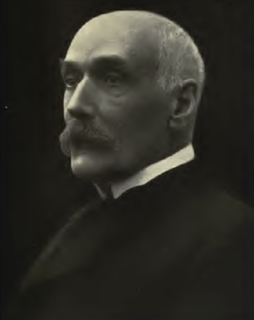
John Xavier Merriman was the last prime minister of the Cape Colony before the formation of the Union of South Africa in 1910.
The South African Party was a political party that existed in the Union of South Africa from 1911 to 1934.
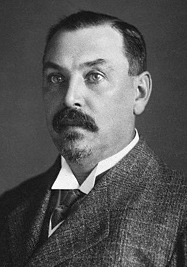
General elections were held in South Africa on 15 September 1910 to elect the 121 members of the House of Assembly. They were the first general election after the Union of South Africa was created on 31 May 1910.

The Reverend Stephanus Jacobus du ToitAfrikaans pronunciation: [steˈfɑːnɵs jaˈkʊɵ̯bɵs dyˈtwa] was a controversial South African nationalist, theologian, journalist and failed politician. In his younger years Du Toit did much to promote the Afrikaans language as a symbol of Afrikaner nationalism. Apart from the years 1882-8 when he was Superintendent of Education in the South African Republic, he lived in or near the town of Paarl in the Cape Colony. Disillusionment with the Kruger regime led him, in later years, to moderate his views. He was instrumental in initiating the translation of the Bible into Afrikaans and was a proponent of the Afrikaans language. He died an outcast.

François Stephanus Malan PC, usually called F. S. Malan or just F. S., was a South African politician.
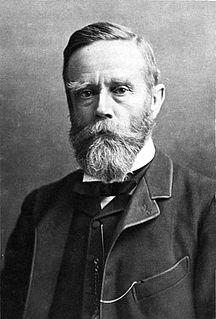
Sir John Gordon Sprigg, was an English-born colonial administrator, politician and four-time prime minister of the Cape Colony.

The South African Wars, including and commonly referred to as the Confederation Wars, were a series of wars that occurred in the southern portion of the African continent during the later years of the 19th century and the first years of the 20th century. Ethnic, political, and social tensions among European colonial powers, as well as increasing hostilities between these powers and indigenous Africans, led to open conflict in a series of wars and revolts between 1879 and 1915, which had lasting repercussions on the entire region. A key factor behind the growth of these tensions was the pursuit of commerce and resources, both by countries and individuals, especially following the discoveries of diamonds in the region in 1867 and gold in 1862.
The Drifts Crisis of 1895 was an imperial-republican confrontation in South Africa that took place in September and October 1895. It was precipitated by the closing of fords, which in South Africa were known as ‘drifts’. The Crisis has traditionally been seen as the precursor to the Jameson Raid and the uncompromising policies of High Commissioner for Southern Africa Alfred Milner which followed, and eventually led to the Second Anglo-Boer War. Historians generally regard the conflicts to have been between the Cape Colony and the South African Republic (SAR), informally known as the Transvaal Republic.

The South African Party was a political party in Cape Colony.

Jacobus Wilhelmus ("J.W.") Sauer, was a prominent liberal politician of the Cape Colony. He served as Minister in multiple Cape governments, and was influential in several unsuccessful attempts to enshrine equal political rights for black South Africans in the constitution of the Union of South Africa. He was also a strong early supporter of women's rights and suffrage.
The Progressive Party of the Cape Colony, was a political party in the Cape Parliament that was primarily composed of and supported by white immigrants to the Cape. It supported pro-imperialist policies, and was in power from 1900 until 1908.

The Parliament of the Cape of Good Hope functioned as the legislature of the Cape Colony, from its founding in 1853, until the creation of the Union of South Africa in 1910, when it was dissolved and the Parliament of South Africa was established. It consisted of the House of Assembly and the legislative council.
Carl (Karl) Ludwig Ferdinand Borckenhagen was an influential journalist and political leader of the Orange Free State, and a founder of the Afrikaner Bond.

Sir James Sivewright K.C.M.G. was a businessman and politician of the Cape Colony, South Africa. He was a strong political ally of Cecil Rhodes and, as his cabinet minister, was implicated in the "Logan" corruption scandal that led to the fall of the first Rhodes government.
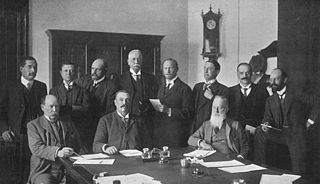
The National Convention, also known as the Convention on the Closer Union of South Africa or the Closer Union Convention, was a constitutional convention held between 1908 and 1909 in Durban, Cape Town and Bloemfontein. The convention led to the adoption of the South Africa Act by the British Parliament and thus to the creation of the Union of South Africa. The four colonies of the area that would become South Africa - the Cape Colony, Natal Colony, the Orange River Colony and the Transvaal Colony - were represented at the convention, along with a delegation from Rhodesia. There were 33 delegates in total, with the Cape being represented by 12, the Transvaal eight, the Orange River five, Natal five, and Rhodesia three. The convention was held behind closed doors, in the fear that a public affair would lead delegates to refuse compromising on contentious areas of disagreement. All the delegates were white men, a third of them were farmers, ten were lawyers, and some were academics. Two-thirds had fought on either side of the Second Boer War.














